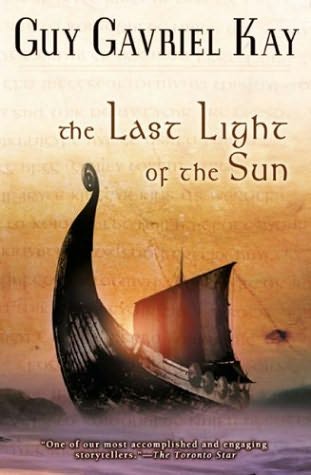The Last Light of the Sun
by Guy Gavriel Kay

Reviewed by Coral
I know it may not have sounded it from my review of A Song For Arbonne but I love Guy Gavriel Kay as an author. His stories grab your attention, drawing you into the world he's created, his pairings at the book's end are never conventional and never predictable, and his endings always add just one more surprise twist to them leaving you wishing for more. His worst books are, by far, better than the best books of some other authors.
This time round he focuses on three cultures in the world he created way back in The Lions of Al-Rassan, and used again in the Sarantine Mosaic. You don't have to read those books first to understand this book. The only thing they have in common is the world he's set them on, but they are very much separate stories; as separate as medieval Spain, the Roman Empire and the Viking world were from each other in our own history.
The three cultures in this book are the Erlings - think Vikings - the Anglycyn - think Anglo-Saxons - and the Cyngael - think Celts.
There's a wide range of characters in this book, too many to mention all of them, but here's a select few as an example: Aeldred, the Anglycyn king, an Arthur like figure who rode at the head of an army to save his people from the Erlings and now wants to leave a peaceful kingdom for his children; Athelbert, Aeldred's impetuous, mischief loving heir; Alun, a Cyngael who's tormented by the night his brother was killed, and what that means to him has turned him away from his god; Bern, an Erling forced into indentured servitude to pay for his father's crimes, who steals a horse meant for a hero's funeral and is on the run for his life; and Ivarr Ragnarsson, a misshapen man determined that someone, somewhere should pay for his grandfather's death.
It's not a bad book. I think it's truly impossible that Guy Gavriel Kay can ever really write a bad book, he's too good an author for that. It's just that, 300 pages in and there's no plot. It feels like all your doing is reading a bunch of stuff that happens. We were never given a bigger picture to wonder at, never asked to imagine, to worry over potential outcomes, just told what's happening.
Even the ending was a little bit disappointing, not as twisty as some of his other books and, frankly, at least one of the pairings were predictable from the moment the two characters met. But I still couldn't put the book down. For all its faults it was still compelling. That's just the kind of author Guy Gavriel Kay is.
Grade: B